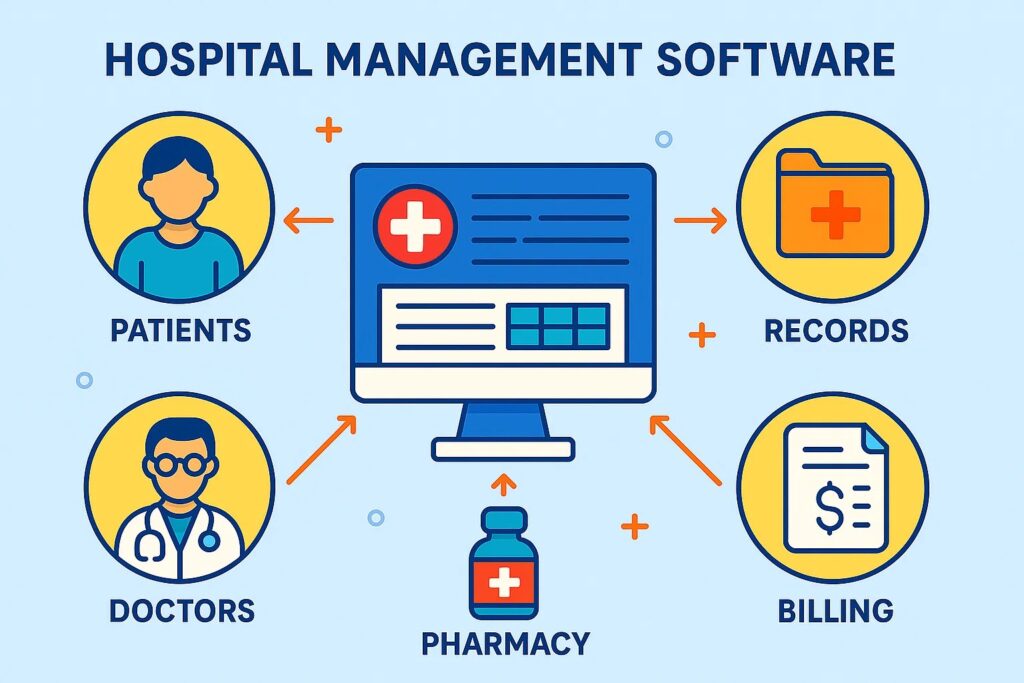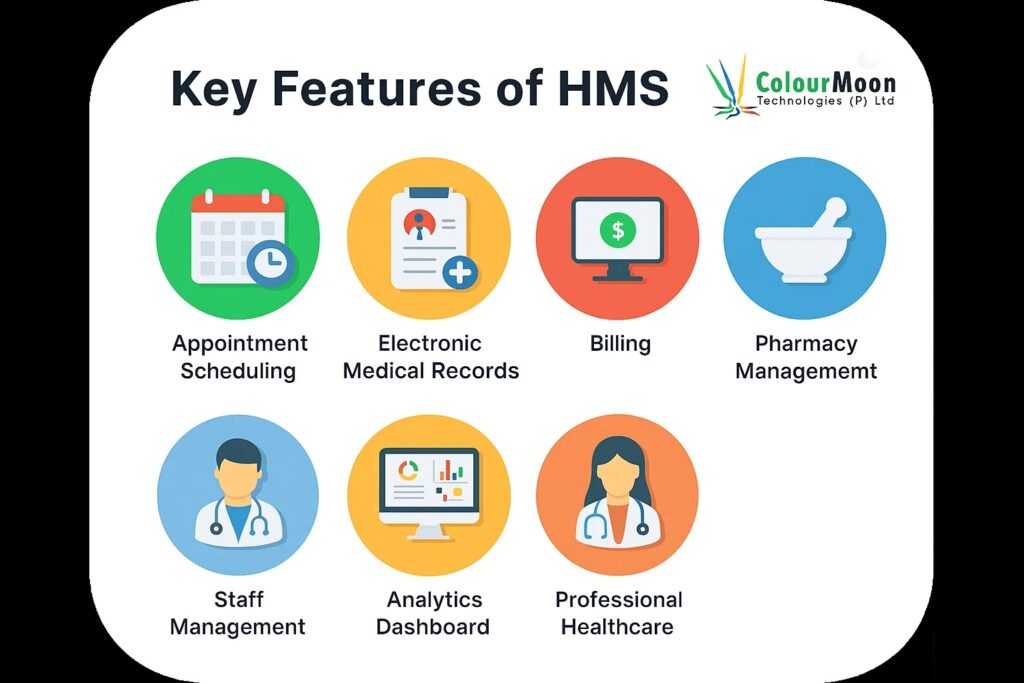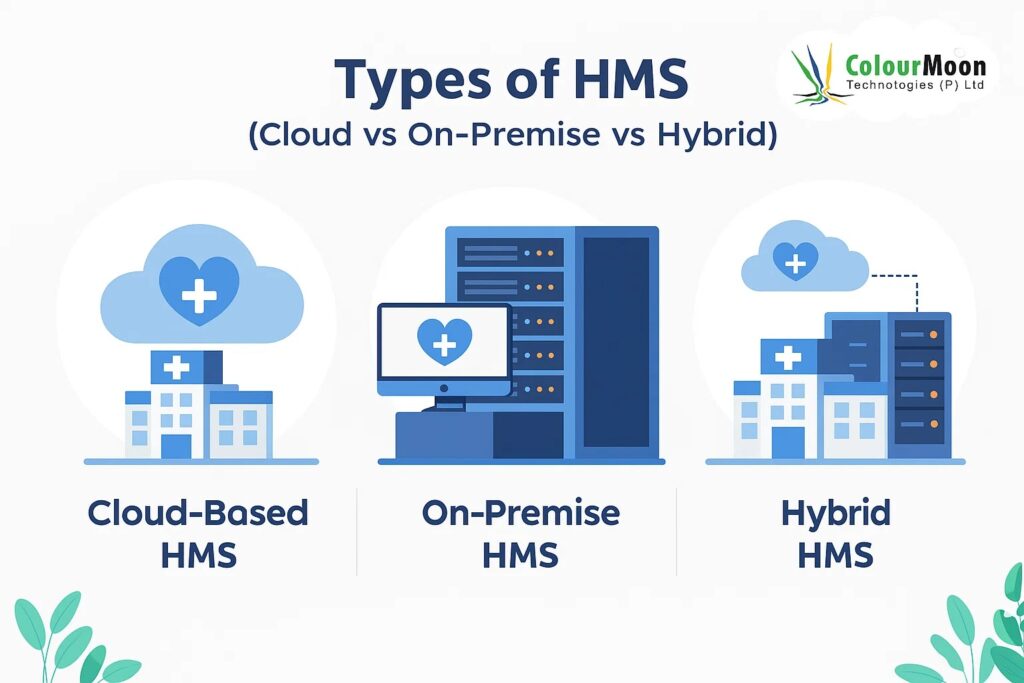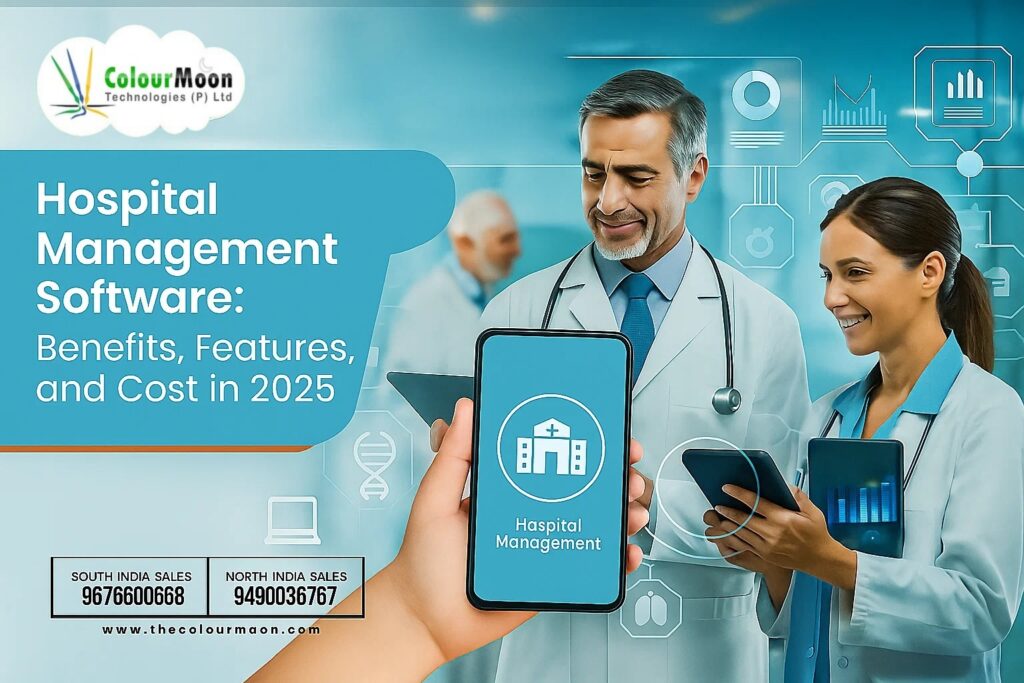Healthcare in 2025 is more connected and data-driven than ever before. Hospitals are moving from paper files and fragmented systems to complete digital ecosystems. At the center of this change is Hospital Management Software (HMS).
This guide explains what HMS is, how it works, the features you should expect, benefits for hospitals and patients, pricing in India, and what lies ahead.
What is Hospital Management Software?

Definition and Purpose of HMS
Hospital Management Software is a system that organizes hospital activities in one place. It handles patient records, appointments, billing, pharmacy stock, and staff schedules. The goal is simple: fewer errors, faster care, and smoother operations.
Hospitals use HMS to cut down on paperwork, store health records securely, and improve communication between departments. In India, HMS adoption is also tied to the Ayushman Bharat Digital Mission (ABDM), which promotes digital health records for every citizen (Ministry of Health and Family Welfare, 2022, https://abdm.gov.in).
How Hospital Management Systems Work
Here is a quick look at the process:
- A patient registers online or at the hospital desk.
- The details are stored in an Electronic Medical Record (EMR).
- Doctors view the full medical history during consultation.
- The pharmacy receives prescriptions instantly.
- Billing is generated automatically and linked with insurance claims.
- Hospital administrators monitor activity through a dashboard.
The system acts like the digital backbone of the hospital, ensuring every step is recorded, connected, and traceable.
Why Hospitals Need Management Software in 2025
Challenges in Manual Hospital Administration
Hospitals that still use paper or unlinked software face issues such as:
- Lost or duplicate records.
- Delays in accessing patient data.
- Billing mistakes that affect revenue.
- Overlapping doctor schedules and resource misuse.
- Long patient wait times.
These challenges directly impact patient trust and hospital performance.
Digital Push in Healthcare
The Indian government is driving healthcare digitization through ABDM. This aims to connect patients, hospitals, and pharmacies under a single digital health network. By 2025, patients also expect mobile-first services, online booking, and digital reports.
Globally, health IT spending is rising, with software solutions like HMS playing a central role (World Health Organization, 2023, https://www.who.int).
Features of Hospital Management Software

Patient Registration and Appointments
HMS makes booking and scheduling easy. Patients can register online, choose doctors, and receive SMS or WhatsApp reminders. Hospitals reduce no-shows and manage queues better.
Electronic Medical Records (EMR)
EMRs store all patient data in one digital file. Lab results, imaging, previous treatments, and allergies are accessible instantly. This helps doctors make better decisions.
Billing and Invoicing
The billing module automates invoices, manages insurance claims, and supports multiple payment modes including UPI and credit cards. This reduces human error and speeds up transactions.
Pharmacy and Inventory
Hospitals lose money when drugs expire or stock runs out. HMS tracks medicines in real time, alerts staff before expiry, and connects with suppliers for reorders.
Doctor and Staff Management
The system helps in creating rosters, tracking shifts, approving leave, and processing payroll. Hospitals run more smoothly when staff scheduling is transparent.
Reporting and Analytics
Dashboards give administrators a real-time picture of patient inflow, revenue, and department activity. These insights support better planning and hospital growth.
Benefits of Hospital Management Software
Better Patient Care
Doctors have full access to patient history, so treatment is faster and more accurate. Patients spend less time repeating tests or waiting for files.
Reduced Workload for Staff
Automation cuts down repetitive work like manual data entry. Staff can focus on patient support instead of chasing records.
Lower Costs
Hospitals save on paper, avoid duplicate tests, and manage staff time better. Over time, this improves financial performance.
Stronger Data Security
Modern HMS platforms use encryption and role-based access, ensuring only authorized staff view sensitive data. This helps hospitals comply with laws like HIPAA in the US and India’s ABDM security standards.
Types of Hospital Management Systems.

Cloud Hosted HMS
- Runs on remote servers.
- Accessed through browsers or mobile apps.
- Affordable setup with flexible subscription pricing.
- Best suited for small and mid-sized hospitals.
On-Premise HMS
- Installed on the hospital’s own servers.
- Offers greater control and customization.
- Requires high initial investment and IT support.
- Common in large hospitals with strong tech teams.
Hybrid Systems
These combine both approaches. Sensitive data can stay on local servers while other operations run in the cloud.
Hospital Management Software Cost in India
Factors That Influence Pricing
- Number of users (doctors, staff, administrators).
- Modules included (billing, pharmacy, EMR, HR).
- Level of customization.
- Type of deployment (cloud or on-premise).
Subscription vs One-Time License
- Cloud HMS: ₹2,000–₹10,000 per user per month.
- On-premise license: ₹5–₹20 lakhs upfront.
Custom Development
Hospitals needing tailored features pay between ₹10–₹50 lakhs in India, depending on complexity and integrations.
👉 Detailed guide: How to Develop Hospital Management System.
Choosing the Right Hospital Management Software
Things to Consider
- Ease of use for doctors and staff.
- Compatibility with lab, pharmacy, and diagnostic systems.
- Compliance with ABDM and HIPAA standards.
Questions to Ask Vendors
- How is data backed up?
- Is support available 24/7?
- Can the software grow with the hospital?
Scalability and Support
A good HMS should grow with your hospital. Whether you start with one clinic or expand to a chain, the software must support that growth.
Hospital Management Software in 2025
AI in HMS
Artificial intelligence is being added to HMS to predict patient admissions, detect billing fraud, and even suggest diagnoses.
Telemedicine
Hospitals can offer video consultations, digital prescriptions, and online payments within the HMS platform.
Mobile Apps
Patients can book visits, view lab reports, and track prescriptions on mobile. Doctors can manage schedules and review patient files anywhere.
Conclusion

Hospitals in 2025 cannot depend on paper records or outdated tools. A well-designed Hospital Management Software brings patient care, staff management, billing, and reporting under one roof.
Hospitals that invest in HMS save costs, deliver better care, and meet rising patient expectations.
👉 Learn more here: Hospital Management Software Solution Development.
FAQ’s On Hospital Management Software
Q1: What is Hospital Management Software used for?
Hospital Management Software is used to manage patient records, doctor scheduling, billing, pharmacy, and administrative workflows efficiently.
Q2: How much does hospital management software cost in India?
The cost ranges from ₹2,000–₹10,000 per user/month for cloud HMS to ₹10–₹50 lakhs for custom development, depending on features and scalability.
Q3: Is HMS necessary for small hospitals and clinics?
Yes. Even small clinics benefit from HMS through streamlined operations, digital records, and better patient management.
Q4: Which is better: Cloud-based HMS or On-premise HMS?
Cloud HMS offers affordability and flexibility, while on-premise HMS gives more control. Hybrid models combine both benefits.
Q5: What are the future trends in hospital management software?
Future HMS will integrate AI, telemedicine, and mobile apps for real-time patient care and predictive analytics.


